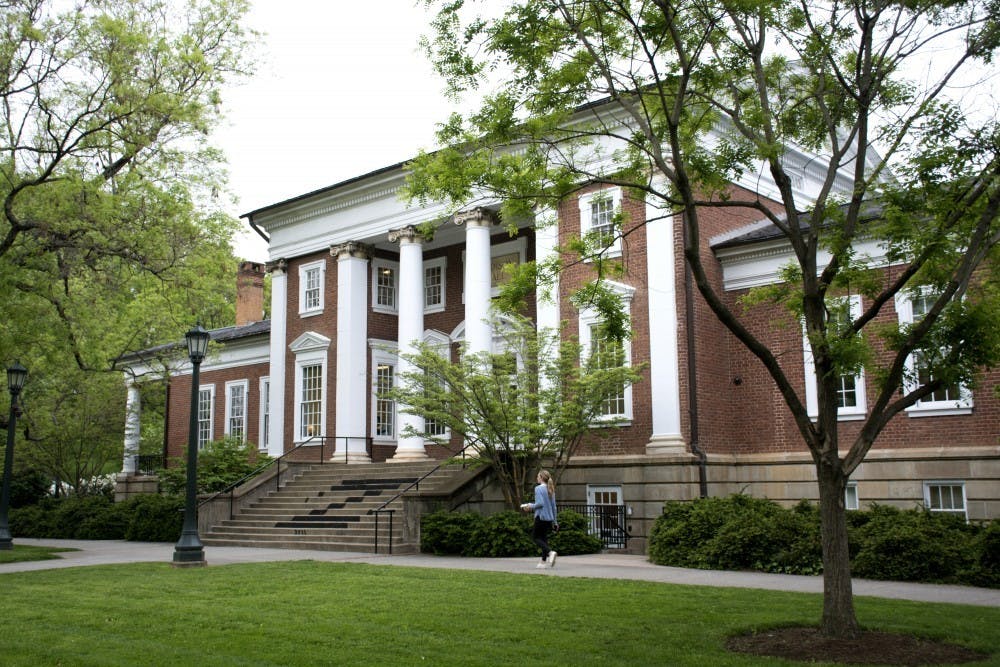Lea en español
The University’s Racial Equity Task Force released its final report titled “Audacious Future: Commitment Required” Monday, recommending the University adopt 12 initiatives to promote systemic change and racial equity through significant investments in financial resources, leadership and accountability.
Commissioned by University President Jim Ryan June 3 amid a nationwide reckoning with racial injustice, the task force comprises Kevin McDonald, vice president of diversity, equity and inclusion; Ian Solomon, dean of the Batten School of Leadership and Public Policy; and Barbara Brown Wilson, assistant professor of urban and environmental planning and faculty director of the University’s Equity Center.
To prepare the final report, the trio received letters from over 1,000 contributors and met with over 300 representatives of student organizations, staff, faculty, alumni and senior-level administrators. They also read “valuable reports prepared by student groups, task forces, commissions, and other stakeholder groups over many years.”
Ryan plans to discuss the full report, which is available on the task force’s website, with the University’s Board of Visitors next week.
The 63-page report outlines 12 key initiatives to encourage meaningful change at the University, listed below in brief:
- Endow Equity at the University: Dedicate adequate financial resources to kickstart and maintain the University’s racial equity initiatives. The report suggests “$100-150 million immediately for investments and spending over the next 3-5 years, $500-650 million in perpetuity by dedicating [Strategic Investment Fund] resources for a permanent quasi-endowment and $100-150 million collaboratively through challenge matching funds (50%) that incentivize targeted philanthropy (50%).”
- Launch the “Equity Scorecard”: Initiate and make publicly available a “scorecard” of the University’s racial equity goals, with indicators borrowed from the University’s “Modified Inclusive Excellence Framework.” The task force recommends that those goals be reviewed annually and used in leadership performance evaluations.
- Fund the Division for Diversity, Equity and Inclusion: Fund and empower the University’s Division for Diversity, Equity and Inclusion — the current budget for which the report characterizes as falling “alarmingly short in comparison to the support for DEI provided by other institutions like University of Michigan, UC Berkeley, University of Texas at Austin, Clemson University and Georgia Tech.”
- Commit to “Represent Virginia” in student body demographics: Recruit, admit and support an undergraduate population that is representative of Virginia’s economic and racial demographics. The University’s Diversity Dashboard shows that the undergraduate population is 6.61 percent African American, 15.33 percent Asian American, 6.62 percent Hispanic American and 0.1 percent Native American or Alaskan Native. The population of the Commonwealth of Virginia is by comparison 19.39 percent African American, 5.50 percent Asian American, 7.90 percent Hispanic American and 0.37 percent Native American or Alaskan Native.
- Launch “Inclusive Faculty Initiative”: Reform search, hiring, mentoring, promotion and retention practices for prospective and current University faculty and double the number of underrepresented minority faculty by 2030. Currently, minority faculty members comprise approximately 200 out of a total faculty of 3,000.
- Build “Pathways for Staff Success”: Improve career development, salary equity and hiring of groups historically underrepresented at the University for leadership positions and contracting opportunities so that Black and Latinx Staff and Contractors benefit from job promotion and wealth building.
- Launch the “Grounds for All Campaign”: Improve the University environment through a rethinking, reframing, retelling and renaming of its historic landscape and through addressing other barriers such as concerns about policing practices. The report suggests achieving this goal in part through removing the University’s George Rogers Clarke statue and “working with the local indigenous community to reimagine what might embody the space where the statue currently stands,” as well as all symbols to the Confederacy and eugenicists on Grounds.
- Provide anti-racism education to all members of the University community: Empower and educate all members of the University community to take effective anti-racist action through an investment in “a robust menu of educational resources.”
- Review tenure and academic policies: Review Promotion and Tenure policies as well as other academic policies to ensure they are both equitable and in accord with global best practices for inclusive excellence.
- Endow the Carter G. Woodson Institute and the Department of African American and African Studies: Create an endowment for and support the long-term growth of the department of African-American and African Diaspora Studies. The report suggests that the endowment should cover the cost of the predoctoral and postdoctoral fellowships, visiting distinguished faculty, programming and operating expenses.
- Launch “Pay Our Debts” reparative scholarship program: Recognize and repay the descendants of the enslaved laborers who built the University by working with the Alumni Association to create scholarships for both degree and non-degree education.
- Restore the Indigenous Nation’s platform: Create a Center for Native American and Indigenous Studies with appropriate staffing, including a Tribal Liaison, to aid in repairing relationships with Indigenous communities.
Along with its recommendations, the report acknowledges that the University has made progress — particularly through initiatives such as raising the base wage for University staff to $15 per hour, the AccessUVA program and other scholarship opportunities, the President’s Commissions on Slavery and the University and the University in the Age of Segregation.
Still, there remains work to be done.
“Nevertheless, the stubborn facts that Black Americans remain grossly underrepresented among students and faculty of all ranks and among administrators and staff at senior ranks, and that U.Va. is still perceived by many current and prospective community members as an inaccessible, rich, ‘white’ institution … signals that substantially more needs to be done,” the report reads.







